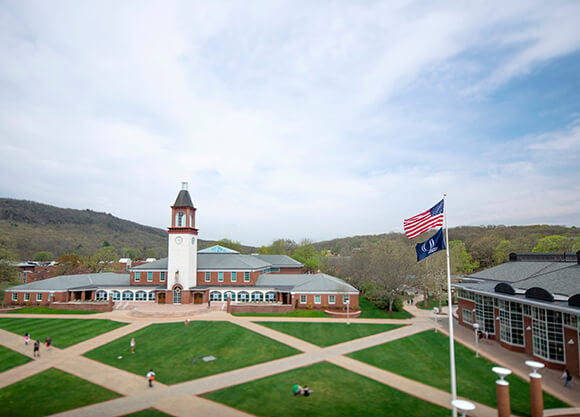
Open letter to the Quinnipiac community on the war in Ukraine from university religious leaders
March 03, 2022

March 03, 2022

The invasion of Ukraine by Russian military forces has brought with it the inevitable evils of war: destruction, suffering and the loss of life.
It has precipitated a major refugee crisis as waves of people flee in an attempt to escape the war zone. But for some members of our community this conflict has had a more personal impact. It isn't occurring in a far-off place where the reports of violence reach us sporadically, and then filtered through professional media sources. This is a war covered by YouTube and TikTok as much as by NPR and the BBC.
For the first time, social media has taken the pivotal role in providing the world access to the chaos in near real time.
In turn, this access has subtly shaped our perception and response to the crisis. Now amateur images and videos eclipse news agencies in giving us first-hand accounts of events often as they unfold. They are the shaky cell phone videos filmed as ordinary people run for cover.
They are the still images of people huddling in underground shelters, metro stations, and building basements.
As a result, the Russian invasion of Ukraine doesn't seem some distant disaster from which we can remain comfortable insulated.
To many, the crisis feels strangely up close. So it's to be expected that we will talk about these events. And we are. The war is increasingly a top of discussion on campus, and in this letter we want to address issues around these types of conversations.
We hope to challenge ourselves and others to be particularly attentive when speaking about these issues because it's easy to oversimplify complex contexts. We fall into speaking of the Russians as if they were a single monolithic "Other." Or we recited the statistics of destruction of Ukraine no differently than if we were reporting yesterday's sports scores.
In every instance, we must remind ourselves that a data point is not simply an abstraction. Rather, each numbers represents the story of a unique human life.
For us at Quinnipiac, we also need to remember that our richly diverse community includes students, faculty and staff from this region of the world.
For them, a discussion of the violence isn't merely an academic exercise.
It's immediate, persona and visceral. Their families, their loved ones, their homes, their past and their future are all caught up in this senseless spiral of destruction. Members of our community need our support now because they're hurting.
So as our campus religious voices, we must make this appeal. We must show support, and our support must begin with sensitivity. We need to be mindful when speaking about these events, especially in publish spaces. The invasion and it's consequences must be discussed – that is without question — but it's the manner and tenor of our discussions that matters most in this moment.
We never know who's standing nearby and listening. For some, we are talking about the lives and safety of everyone they love. For others, we can easily and inadvertently make someone feel ostracized simply because of the inhumane foreign policy actions of their government.
Additionally, our Ukrainian and Russian Bobcat students need our special care and attention. They are wrestling with an anxiety and fear that most of us could not fathom. As a community, we need to acknowledge their pain.
A kind word is never unwelcome. But when they need more, we are here to help. The Office of Religious Life, Student Health Services, Department of Cultural and Global Engagement, and our CARE team are all ready to assist any student in need. Please let them know they can reach out to us at any time.
May peace and justice soon prevail in Ukraine and through the world! That is our hope and our prayer.
The Quinnipiac University religious leaders
Father Jordan Lenaghan, OP
Executive Director, University Religious Life
Rabbi Reena Judd
Quinnipiac University Rabbi
Father Joachim Kenney, OP
Staff Chaplain for Catholic Life
Professor Iddrisu Awudu
Muslim Religious Life Coordinator
As Quinnipiac University's religious leaders, we represent various faith communities and traditions on campus. At this moment, we come together to speak with one voice: we categorically condemn the invasion of Ukraine. The twisting of historical narratives to fit immoral political ends reminds us of the value of the academic study of history. We also judge the warping and weaponization of religious worldview and institutions to justify the state-sponsored evil to be equally reprehensible. Its antidote is nuanced religious literacy: to understand better one's own beliefs as well as to understand the beliefs of one's neighbors.
Quinnipiac Today is your source for what's happening throughout #BobcatNation. Sign up for our weekly email newsletter to be among the first to know about news, events and members of our Bobcat family who are making a positive difference in our world.
Sign Up Now